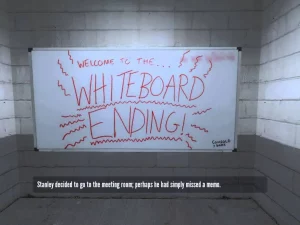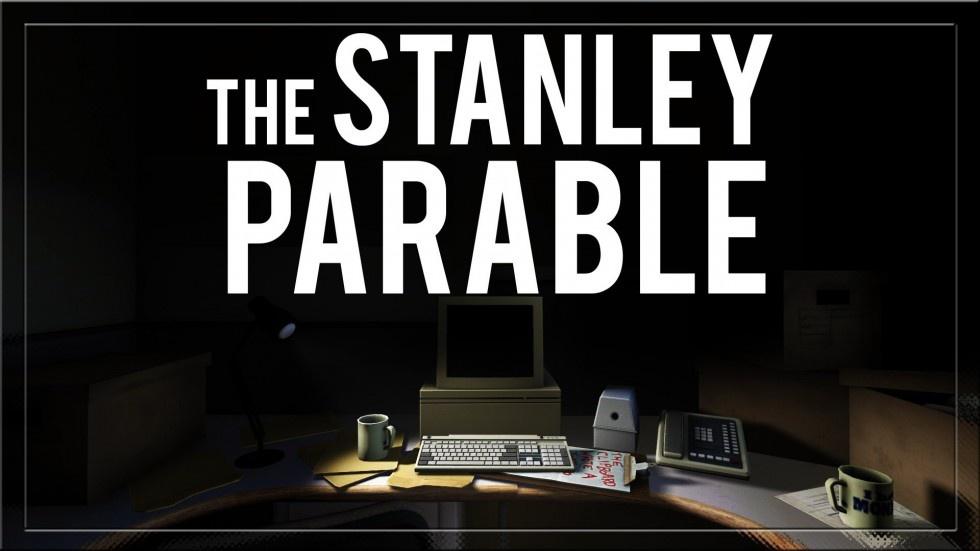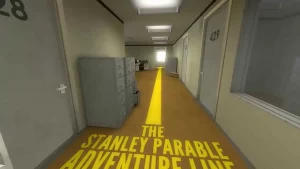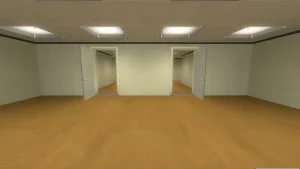Game, Creator, and Platform:
The Stanley Parable is a narrated, walking experience created by Davey Wreden and William Pugh and published by Galactic Café. The game was released in 2013 on Windows, macOS, and Linux.
Target Audience:
The game is perfect for people who enjoy meta-commentary, dry humor, little action, “idea-driven” narratives, and who have completionist tendencies.
Important Formal Elements:
The game’s most important formal element is “Conflict.” Throughout the game, the player must make choices as prompted by the narrator. Early in the game, this often means deciding whether to listen to the narrator’s instructions or defy them in an attempt at expressing free will. The most obvious example of this is when the player reaches what is known as the “Two Doors Room,” where the narrator will say: “When Stanley came to a set of two open doors, he entered the door on his left.” The player can progress the story by either following the narrator’s words and taking the left door or going through the right and facing the consequences of defiance.

I would argue that the most sensationalized formal element in The Stanley Parable is “Outcomes.” Unlike most single-player games, with only one set ending, there are 19 different achievable endings in the original game. Most players will find themselves combing through every possible string of events in the game to experience every ending the game has to offer as part of its content. And no full playthrough is truly complete without doing so.
Finally, the game has very strict “Boundaries” within which the player must operate. Firstly, in contrast to something like an open-world game, The Stanley Parable has a very linear progression and level design. Players are funneled through claustrophobic areas to progress through the game and are never truly free to move around however they want. Doors even tend to close behind players as they move through rooms, further limiting their pathing. Additionally, the base game offers no movement controls beyond walking and crouching, limiting the possible ways for players to navigate around the map, especially vertically. No matter what they do, the player must always move down a path that has been previously laid down for them by the developers. The narrator’s commentary highlights the illusion of choice and makes clear to the players how bound they truly are.
Type of Fun:
The Stanley Parable‘s types of fun are “Narrative” and “Discovery.” It seeks to provide an interesting story coupled with thought-provoking commentary and witty humor. In this regard, the game succeeds remarkably. Each and every path leads the player down a different narrative path accompanied by a fourth-wall breaking narrator who may guide, inform, or mess with the player as a companion through the nonsensical environments they traverse. It is through walking that the player discovers the narrative and interacts with the narrator. Through walking, they develop different relationships with the narrator as they begin to question the very nature of reality, game design, and free will.
Moment of Success/Failure:
Upon reaching the Mind Control Room and activating the lights button, the player can climb onto the chair and onto the desk to walk over the railing and fall to the bottom of the mind control room, glitching/softlocking the game as the player is stuck and the narrator doesn’t respond, leaving the player to have to trigger a manual restart. However, what was once seen as a victory by the players to actually break out of the game’s “boundaries” (because the Out of Map Ending is intentional so it doesn’t count) has now been patched in the game’s new Ultra Deluxe Edition, where the narrator now acknowledges and explains the glitch before playing a song to mock you for achieving it and being so foolish as to think you could still break the game through it.
Improvement to Make:
For the most part, I think the game is great as is. My biggest issue with it would be the dated visuals and I would like to see it remastered on the new Source Engine. Besides that, adding new paths and narratives to commentate on new developments in our culture, gaming, and the legacy and narratives of the original game would be great and seem to already be what the developers have done with the new Ultra Deluxe edition of the game. Maybe adding new movement like jumping could add to narrative potential (Or be implemented in a pointless “jumping circle” to mock the idea as being anything more than redundant to the game’s existing movement mechanics). In truth, all of these ideas and more have already been predicted and commented on by the game in the new edition, and as such it feels difficult to escape the game’s scope even while writing this now. I guess it’s true what they say:






